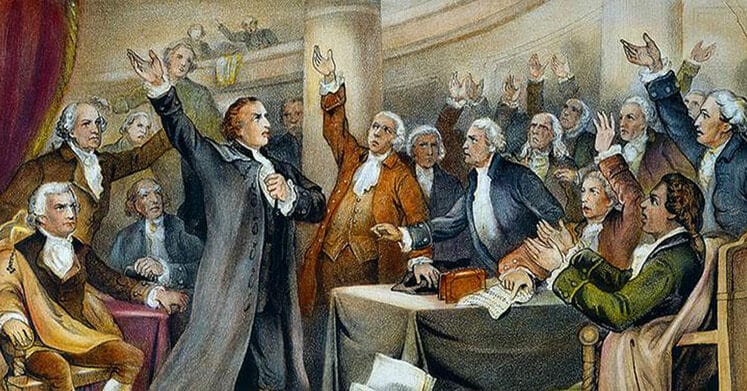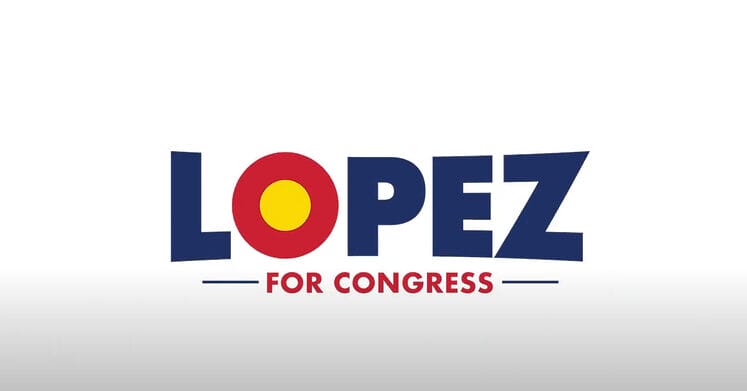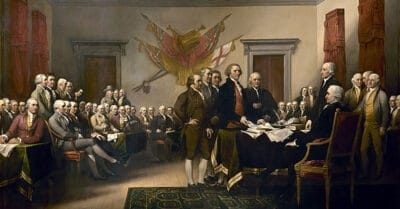“A Republican, or free government, can only exist where the body of the people are virtuous.” (Centinel #1)
One aspect of free governance that the Founding Fathers and those who opposed our Constitution both agreed on is the necessity of virtue within the citizenry. Liberty and Freedom take hard work, they are dangerous and there is a necessity of having ample amounts of trust to make a free society function. Before we adopted the Constitution as we now know it, fierce debate occurred over the proposed new Federal Government and whether it was just, reasoned, and would stand the test of time. The Federalist Papers were a by-product of a concerted campaign to educate and persuade the fledgling country that a federal government was necessary while the Antifederalist Papers were arguments against. While many of the arguments made in the Antifederalist Papers were lost (The Senate, term lengths, etc.), those who wrote them were very educated and reasoned in their arguments. Those who wrote them also were staunch advocates for liberty. It would be remise of us not to examine them if only to find foreshadowing insights unto what dangers a federal government can encounter.
“Many instances can be produced in which the people have voluntarily increased the power of their rulers; but few, if any, in which rulers have willingly abridged their authority.” (Brutus #1)
Even though the argument was mostly over the methods of Liberty, both sides had a solid understanding of human history and human nature. At the time of these arguments, the world had yet to see Marxism and communism and yet the Founders already knew the inevitable outcome of that system of governance. The human tendency of adverse selection with regards to power is why many of us were naturally cautious towards “two weeks to flatten the curve.” Unfortunately, we were right. The vast majority of government and regulatory agencies only tightened their grasp on that power even after the science and evidence showed they were wrong. The tyrannical showed their true colors by enforcing ever more strict and diabolical violations and mandates for the sake of “public health.” But this goes beyond just the Covid overreaction-how many government agencies have voluntarily given up jurisdiction or powers? How often are laws repealed at even a municipal level even when it is clearly evident they don’t work or have no value added? Has Congress ever disbanded an agency or department? Early revolutionaries understood what we today take for granted because they lived under this monarchical power. I pray that we do not have to undergo such a dramatic regime to understand what we all should have been taught in High School: the proper purpose of government and the virtue of civic knowledge. “It is much easier to dispense power, than recall them.” (DeWitt #1)
“[A]nd every man is a Traitor to himself and his posterity, who shall ratify it with his signature, without first endeavoring to understand it.” (DeWitt #1)
The increase in frequency of hearing “We have to pass it to understand all that is in it” should be alarming to every citizen of this Republic, yet increasingly many people seem to be agreeing and justifying it. While DeWitt was talking about the proposed Constitution, he was advocating that all should practice the virtue of self-assertion to learn. He claimed it was not only necessary but that to not do so was akin to treachery, a very high crime which led to the very visual act of hanging. How much more sincere would our neighbors be if we accused them of being a traitor for not understanding the laws passed? Would they listen harder or search more deeply for truth if they knew they were betraying their kids and grandkids by using ignorance or lack of interest as an excuse? Or even worse, are they betraying themselves by not trying to search for truth or clarity?
“The persons who enter reluctantly into office become habituated, grow fond of it, and are loath to resign it.” (DeWitt #3)
Our current President is the poster child of a career politician. But this is not just a Democrat issue: 3 of the top 5 most senior Senators are Republican, all with over 30 years in office. They may be the best Statesmen in D.C., but is this the best way to have representation for a vast Republic like ours? I have heard very persuasive principled arguments from both sides of the term limit debate, but I do begin to have trepidation when “campaign finance reforms” seem to heavily skew the elections towards the incumbents. It is difficult not to see a bludgeoning government budget filled with superfluous spending in many of these incumbents’ home districts and not see the worry that the antifederalists had in a large federal government. Of all the issues, on face value this seems the easiest to fix: add term limits. But it also would require the vote of people who have grown fond of their position in office and, based on how they vote on their own pay raises, seems unlikely that the proposal would be enacted by the ones in power.
“In so extensive a republic, the great officers of government would soon become above the control of the people, and abuse their power to the purpose of aggrandizing themselves, and oppressing them.” (Brutus #1)
Paging Doctor Fauci. What news channel has he NOT been on? Is there a household in America that does not know his name? But this also goes beyond just one person and also includes the massive regulatory agencies that Congress has lazily handed their powers to. The EPA, HHS, FDA, FBI, and IRS are just a small sampling of regulatory agencies rising above the control of the people. The progressive model of governance has thrust us back into pre-revolutionary thinking. Instead of having mutual civic trust in our neighbors, we instead are told to trust the government. Instead of having the virtue of self-reliance, we are told instead to rely on the government to restrain our actions or our neighbors, instead of using reason and prudence to guide our lives. The arguments for a large regulatory state become unnecessary if the citizens of a free country instead had the simple, core virtues of self-reliance, self-restraint and self-assertion. But our lack of civic knowledge and dependence on the government has lulled us to sleep and one of the great fears of the antifederalists is happening right in front of us.
While the Federalist Papers are justly a cornerstone on civic education to understand the “genuine meaning” of the Constitution, a study of the Antifederalist papers is still warranted for many of the same reasons one should study Tocqueville. Knowing the arguments and warnings of what could happen to this country keeps us from inevitably either repeating history or falling prey to those very actions we were warned against. The Antifederalists were not entirely right in their justified worry of an overreaching federal government; we the people are still needed to provide the consent to be governed, and our forefathers protected the one right to secure all other rights: revolution. This right is the great deterrent, one we will hopefully never need, but one to remind those who seek to abuse the powers invested in them to not trample on our rights and to remember who is in charge: We the People.









Responses
This article is superb. It has given me reason to dig out my copy of the The Federalist Papers. I don’t think any of the issues yo touched on are being taught in our schools. And, given the current climate I don’t think I would want the teacher’s addressing these truths. Thank you Allen. I would love to meet you. I too, am a graduate of the LPR, but I went when it was called RLP.
Sharing with my daughter who is taking an AP US history class. She is also required to debate from the anti-federalist side in her Government side.
The Federalists were not federalists. They were at best nationalists and many of them were monarchists. The real federalists were the Anti-Federalists which name they did not take for themselves. You will also find the most devout Christians among the Anti-Federalists, like Patrick Henry. Patrick Henry refused his invitation to attend the Philadelphia Convention in 1787 saying, “I smell a rat.” He then spoke at the Virginia Ratification Convention in opposition for 7 hours straight without notes. The real history, particularly the Anti-Federalist were written out of our history for the first 150 years. The first thing the Federalists did when the Philadelphia Convention convened in 1787 was to swear the delegates to a 50 year oath of silence regarding the proceedings of the convention. Fortunately, Anti-Federalist Luther Martin came a few days late and refuse to take such an oath. Before the 1787 convention adjourned, 17 of the delegates had left in disgust because the convention exceeded the scope of authority that the delegates had been sent with. As you now know, that did not stop the Federalists from completely rewriting the constitution they were sent to amend, The Articles of Confederation.